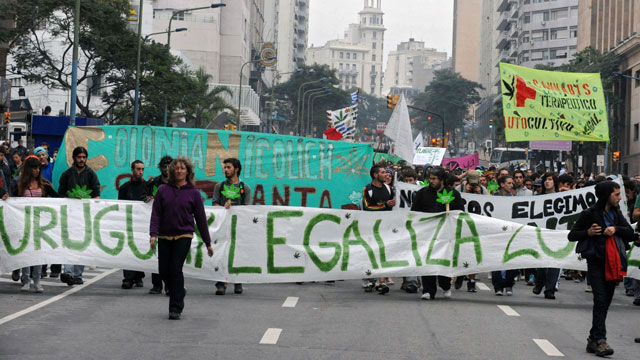By Phil Mattingly & Alison Vekshin - Aug 30, 2013 12:01 AM PT
The U.S. won’t challenge laws in Colorado and Washington that legalized the recreational use of marijuana and will focus federal prosecutions on ties to organized crime, distribution to minors and transportation across state lines, the Justice Department said.
Attorney General Eric Holder yesterday told the governors of the two states that U.S. attorneys will concentrate on certain priority areas and work with them to set rules for the marijuana industry.
The decision marks the first time the U.S. government has condoned recreational marijuana use and opens the door for other states to consider it. Voters in Washington and Colorado became the first to legalize it in November. Nineteen statesallow medical marijuana use, according to the National Conference of State Legislatures.
In a memo to federal prosecutors around the country, Deputy Attorney General James Cole said that, beyond the priority areas, “the federal government has traditionally relied on states and local law enforcement agencies to address marijuana activity” under their own laws.
The new guidelines are “a major and historic step toward ending marijuana prohibition,” said Dan Riffle, federal policy director for the Marijuana Policy Project.
“The next step is for Congress to act,” said Riffle, whose Washington-based group is the largest advocating legalization. “We need to fix our nation’s broken marijuana laws and not just continue to work around them.”
Growing, selling or possessing marijuana remains illegal under federal law.
Criminal Activity
Besides monitoring marijuana activities for ties to crime, use by minors and out-of-state trafficking, prosecutors have been instructed to focus on preventing state-authorized endeavors from being a cover for illegal drugs, violence in pot cultivation and driving under the influence of marijuana.
The government also will pursue cases where marijuana is grown on public lands or when it is carried on federal property, according to the Justice Department’s memo.
Officials in Washington and Colorado, as well as businesses associated with marijuana, have been pressing the Justice Department to make a decision on what the federal government would do where recreational use has been legalized.
“This very carefully considered approach by the federal government will allow our state to move forward and show the country a way a well-regulated system can be effectuated in a state while still respecting the federal Controlled Substances Act,” Washington Governor Jay Inslee, a 62-year-old Democrat, said yesterday at a news briefing in Olympia.
Trusting States
“What I’m hearing from the federal government is that they believe there’s a reason to trust the states of Colorado and Washington,” Inslee told reporters. “So we’re not going to allow distribution of this product in a way that has massive leakage outside the state of Washington. We’re not going to allow distribution of this product to minors.”
Colorado Democratic Governor John Hickenlooper, 61, said yesterday the state shares the Justice Department’s enforcement priorities. The state is “determined to keep marijuana businesses from being fronts for criminal enterprises or other illegal activity,” he said in a statement.
‘A Mistake’
New Jersey Governor Chris Christie, 50, a Republican who is seeking re-election in November and may run for president in 2016, called Holder’s decision not to challenge recreational marijuana laws “a mistake.”
It amounts to a “de facto” legalization, said Christie, a former U.S. attorney. New Jersey won’t move toward legalizing the recreational use of marijuana, the governor told reporters in Point Pleasant yesterday.
Washington and Colorado have been designing regulations for the cultivation and sale of recreational marijuana while the Obama administration formulated its position on the state laws.
The Justice Department said it reserves the right to preempt the states should they run afoul of the new guidelines.
To contact the reporters on this story: Phil Mattingly in Washington atpmattingly@bloomberg.net; Alison Vekshin in San Francisco at avekshin@bloomberg.net
To contact the editors responsible for this story: Steven Komarow atskomarow1@bloomberg.net; Stephen Merelman at smerelman@bloomberg.net










